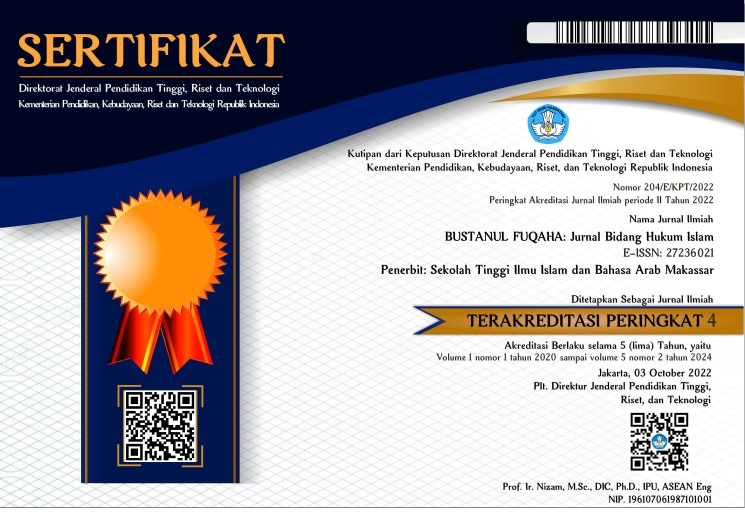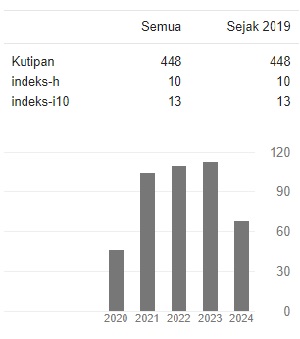Implementasi Hukum Islam dalam Masyarakat Indonesia (Pendekatan Sosiologi Hukum)
DOI:
https://doi.org/10.36701/bustanul.v1i4.285Keywords:
West, Law, Islam, Independence, SociologyAbstract
This study aims to determine how the application of Islamic law in Indonesia in the sociological review of law both before and after independence. This research is a type of library research using a philosophical and sociological approach. The results of this research show that: The development of Islamic law in Indonesia has started since before independence and after independence, namely the old order and Entering the new order era under President Soeharto the issuance of Law number 2 of 1989 concerning the national education system which strengthens religious lessons into compulsory lessons from elementary to college. Law No.7 of 1989 regarding religious courts, compilation of Islamic law, Pancasila Muslim charity foundation, construction of Hajj dormitories, special program madrasah aliyah, postgraduate programs at IAIN, Arabic broadcast on TVRI, the formation of religious organizations such as MUI, ICMI, IPHI etc. There are two problems that have a major impact on the application of Islamic law in Indonesia. First: because of the entry of Western law and because it intersects with customary law. Second: Due to political influence and community culture. In a sociological view, Islamic law is difficult to implement perfectly, because Islamic law is both in the area of religion and in the territory of the state. This social problem causes a tug of war between religious principles and state principles. The solution to this tug of war is that in the public domain it is the responsibility of the state, while the individual area is given to religion. Judging from the sociological aspect, the material products of Islamic law in Indonesia must be able to accommodate the problems in dispute and how they are resolved in simple society and modern society. This research is expected to be an additional reference in knowing the application of Islamic law in Indonesia in the sociological review of law both before and after independence.
Downloads
References
Al-Qurtubi, Abu ‘Abdullah Muhammad bin Ahmad al-Ansari. al-Jami’ li Ahkam al-Qur’an, jilid II. Kairo: Dar al-Kitab al-‘Arabi, 1967.
Al-Zuhaili, W. (1986). Usṣūl Al-Fiqh al-Islam. Beirut: Dar Al-Fikr.
Ali, Z. (2015). Sosiologi Hukum, Cet.9. Jakarta: Sinar Grafika.
Cahyani, A.I. (2011). Problematika Penerapan Hukum Produk Pemikiran Hukum Islam sebelum dan sesudah lahirnya UU Nomor 7 Tahun 1989, Cet.I. Makassar:Alauddin Universty Press.
Ismatullah, D. (2011). Sejarah Sosial Hukum Islam, Cet.I. Bandung: CV.Pustaka Setia.
Ikhsan, M. (2018). Sejarah Mazhab Fikih di Asia Tenggara. NUKHBATUL'ULUM: Jurnal Bidang Kajian Islam, 4(2), 120-134.
Jurdi,S. (2013). Hukum Islam: Gerakan Sosial Islam Indonesia: Peraturan Wahdah Islamiyah dan Gerakan Transnasional. Cet.I. Makassar: Alauddin Universty Press.
Kementerian Agama R.I.(2012). Al-Qur’an dan Terjemahnya. Jakarta: PT. Sinergi Pustaka Indonesia.
Mardani.(2015). Hukum Islam: Pengantar Ilmu Hukum Islam Di Indonesia, Cet.II. Yogyakarta:PustakaPelajar. Mahmuddin (2013). Transformasi Sosial: Aplikasi Dakwah Muhammadiyah Terhadap Budaya Lokal, Cet.I. Makassar: Alauddin Universty Press.
Pujiono. (2012). Hukum Islam: Dinamika Perkembangan Masyarakat Meguak Pergeseran Perilaku Kaum Santri, Cet.I. Yogyakarta: Mitra Pustaka.
Samin, S. (2012). Hukum Islam di Indonesia versus Piagam madinah,Cet.I. Makassar: Alauddin University Press.
Tarigan, A. A. (2008). ‘Umar Ibn Al-khaththâb Dan Siyâsah Syar ‘iyyah. MIQOT: Jurnal Ilmu-ilmu Keislaman, Vol.32, No.1.
Utsman, S. (2013).Hukum Islam: Dasar -Dasar Sosiologi Hukum: Makna Dialog Antara Hukum dan Masyarakat, Cet.III. Yogyakarta: Pustaka Pelajar. Undang-undang Peradilan Agama UU Nomor 50 Tahun 2009 dan Kompilasi Hukum Islam ( KHI ). (T.th). Yogyakarta:Graha Pustaka.














